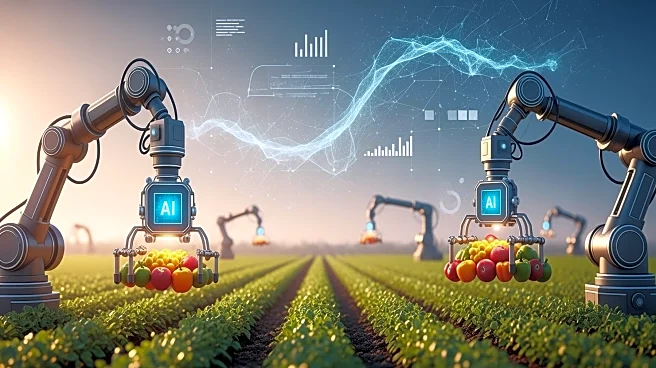What's Happening?
The agricultural food loss reduction solutions market is projected to grow from USD 14.50 billion in 2025 to USD 22.50 billion by 2030, at a compound annual growth rate (CAGR) of 9.2%. This growth is driven
by increasing concerns over food security and sustainability, with nearly one-third of global food production wasted before reaching consumers. The market is seeing substantial investment in advanced cold chain logistics, AI-enabled inventory management, and precision agriculture. North America currently leads in market share, while Asia Pacific is emerging as the fastest-growing region. Key players in the market include Deere & Company, DJI, Lineage Inc., and Cargill.
Why It's Important?
The expansion of the agricultural food loss reduction solutions market is significant as it addresses critical issues of food security and sustainability. With a substantial portion of global food production lost before consumption, these solutions aim to minimize waste and enhance food security. The adoption of advanced technologies such as AI and IoT in agriculture can lead to more efficient food distribution and storage, potentially reducing hunger and improving resource efficiency. Stakeholders, including governments and private entities, stand to benefit from improved food security and reduced economic losses associated with food waste.
What's Next?
As the market continues to grow, further technological advancements and investments are expected, particularly in regions like Asia Pacific. Countries such as India and China are scaling IoT-based monitoring and AI-powered logistics to reduce inefficiencies. The focus will likely remain on developing infrastructure and technologies that can effectively reduce food loss across the supply chain. Stakeholders may continue to explore collaborations and innovations to address challenges such as high capital costs and fragmented supply chains.
Beyond the Headlines
The push for agricultural food loss reduction solutions also highlights broader ethical and environmental considerations. Reducing food waste not only addresses hunger but also contributes to environmental sustainability by minimizing resource use and greenhouse gas emissions associated with food production. The integration of technology in agriculture could lead to long-term shifts in farming practices, promoting more sustainable and efficient food systems globally.










